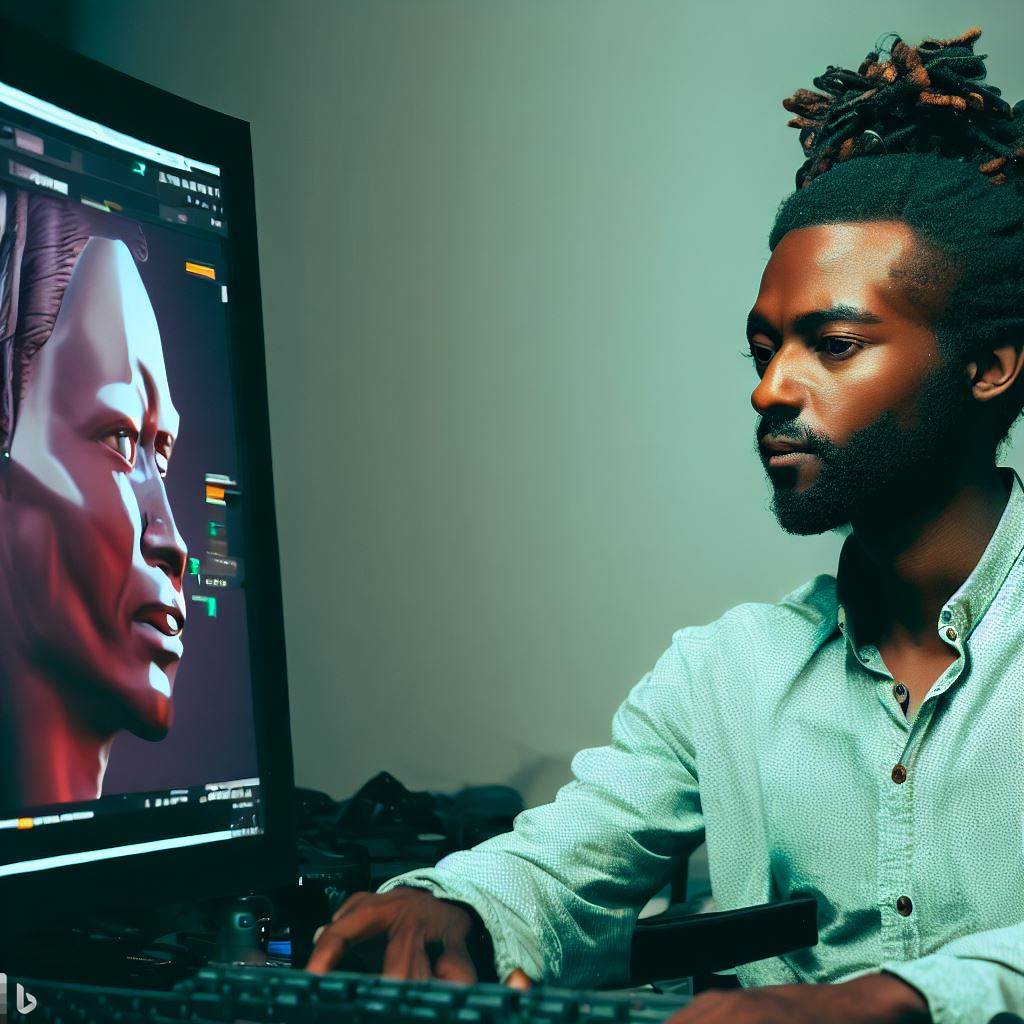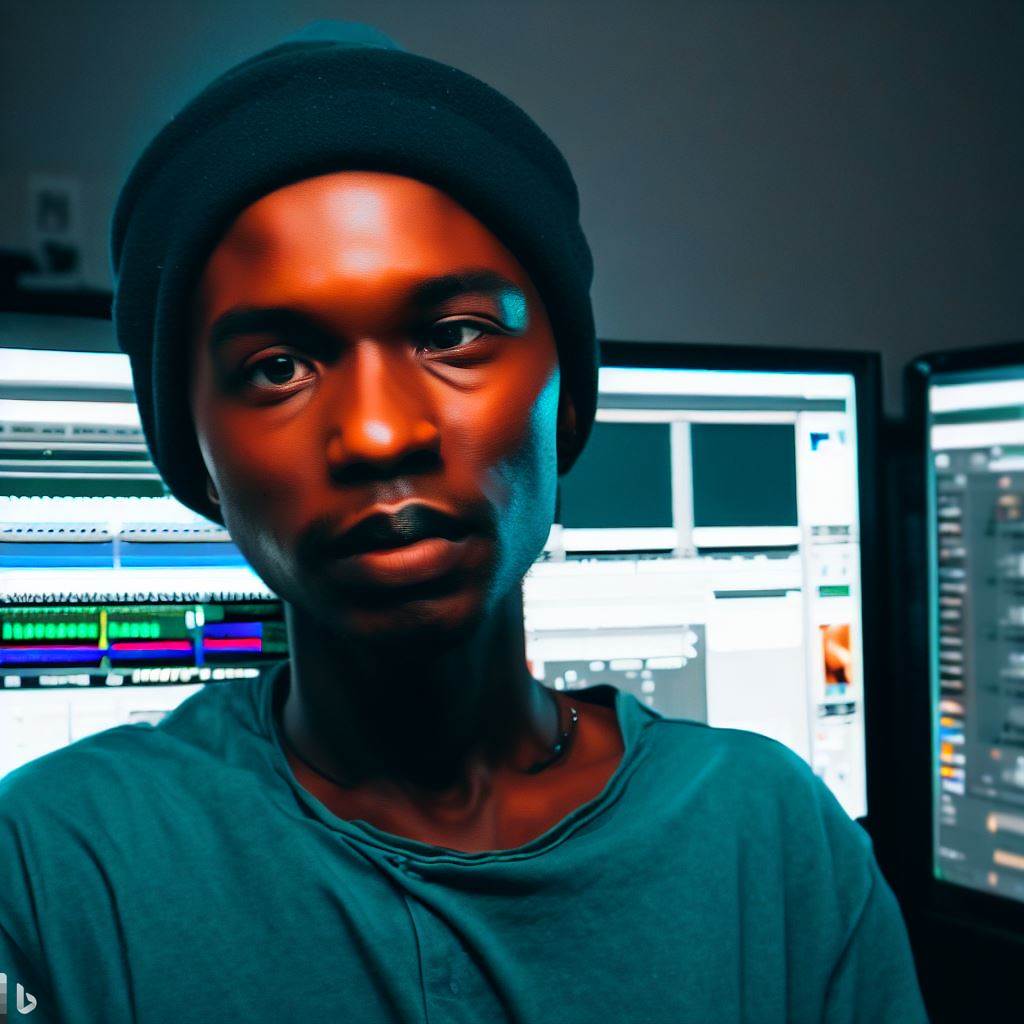Introduction
Nollywood is the Nigerian film industry that is renowned for its low-budget productions and worldwide popularity.
Film editing refers to the process of manipulating and rearranging video shots to create a cohesive narrative.
The influence of Nollywood on film editing in Nigeria can be seen through its innovative techniques and approaches.
The rise of Nollywood has had a profound impact on film editing practices in Nigeria. Nollywood filmmakers have embraced non-linear editing systems, enabling faster editing processes.
The use of jump cuts and quick transitions has become prevalent in Nollywood movies, adding to their distinct style.
Nollywood’s fast-paced storytelling has influenced the pacing and rhythm of film editing in Nigeria.
The industry’s insistence on quick turnarounds has also pushed editors to work efficiently without compromising quality.
Nollywood’s success has led to increased demand for skilled film editors in Nigeria. The influence of Nollywood extends beyond editing techniques, with its storytelling shaping the overall cinematic experience.
Nollywood has expanded the possibilities for creativity in film editing, encouraging experimentation and unconventional approaches.
In the end, Nollywood’s impact on film editing in Nigeria is undeniable, revolutionizing the practice and pushing boundaries.
A Historical Perspective
Early origins of Nollywood
Nollywood, the Nigerian film industry, emerged in the 1990s and quickly gained popularity.
The introduction of non-linear editing systems allowed for more creativity and flexibility in storytelling. Nollywood’s rapid production pace influenced the editing process, emphasizing speed over precision.
The rise of Nollywood resulted in more demand for professional film editors, leading to a significant growth in the industry.
Nigerian editors began experimenting with visual effects, enhancing the overall cinematic experience.
Nollywood films explored different editing styles, blending traditional Nigerian storytelling with modern techniques.
Nollywood’s influence on film editing spread beyond Nigeria, inspiring other African countries to develop their local film industries.
Development of film editing techniques in Nigeria
Initially, Nollywood films were shot on VHS tapes, leading to limited editing options.
The success of Nollywood propelled the industry to produce higher-quality films, prompting improvements in editing techniques.
Nollywood filmmakers started attending international film festivals and workshops to expand their knowledge of editing.
The accessibility of editing software allowed aspiring filmmakers to learn and practice their skills independently.
Nollywood’s editing style often prioritizes emotions, focusing on intense scenes and impactful visual storytelling.
Many Nollywood films feature quick cuts and dynamic sequences, keeping the audience engaged throughout.
The use of montage and parallel editing became prevalent in Nollywood films, adding depth to narratives.
The impact of Nollywood’s growth on film editing styles
As Nollywood grew, the industry started using digital technology, improving editing techniques.
Nollywood’s influence on film editing has challenged traditional Nigerian storytelling techniques, introducing more modern approaches.
The increased emphasis on post-production in Nollywood has led to collaborations between directors and editors to enhance the final product.
Nollywood’s growth has also sparked conversations about copyright issues and the need for stronger intellectual property protection.
The influence of Nollywood on film editing has contributed to the diversification of storytelling styles in Nigerian cinema.
As technology continues to advance, Nollywood’s impact on film editing is likely to evolve and shape the industry further.
The influence of Nollywood on film editing in Nigeria extends beyond the technical aspects, shaping the overall cinematic experience.
Nollywood’s success has inspired a new generation of Nigerian filmmakers and editors to explore their creativity.
Collaboration between Nigerian and international film editors has fostered knowledge exchange and promoted the growth of film editing in Nigeria.
The influence of Nollywood on film editing is a testament to the power of a growing industry to shape artistic practices.
In fact, Nollywood’s impact on film editing in Nigeria has been significant and instrumental in shaping the industry’s growth and development.
From its early origins to the use of digital technology, Nollywood has constantly pushed the boundaries of editing techniques.
The industry’s success has inspired a new generation of filmmakers and editors to explore innovative approaches.
Through collaborations, knowledge exchange, and the adaptation of new technologies, Nollywood continues to influence and redefine film editing in Nigeria.
Read: Nigeria’s Top Editing Courses: A Comprehensive Review
The Evolution of Editing Techniques in Nollywood
Nollywood has come a long way in terms of film editing techniques.
Nollywood films have dramatically changed from linear to digital editing, embracing creative styles and techniques over time.
Traditional Linear Editing Methods
In the early days of Nollywood, films were edited using traditional linear editing methods.
This involved physically cutting and splicing pieces of film together to create a coherent narrative.
It was a time-consuming and labor-intensive process that required skilled editors to meticulously piece together the footage.
Transition to Digital Editing Systems
With the advancements in technology, Nollywood began to embrace digital editing systems in the late 1990s. This transition allowed for more flexibility and efficiency in the editing process.
Editors could now easily manipulate footage, add visual effects, and experiment with different transitions to enhance storytelling.
Emergence of Innovative Editing Styles in Nollywood Films
As Nollywood continued to grow, filmmakers started experimenting with innovative editing styles to captivate audiences.
One of the notable styles is parallel editing, where two or more storylines are intercut to create tension or build suspense.
This technique has been effectively used in action-packed Nollywood films, adding a dynamic element to the storytelling.
Another editing style that gained popularity in Nollywood is montage editing. Montage sequences involve the rapid juxtaposition of images to convey the passage of time or evoke emotions.
This technique has been employed to intensify emotional moments or create a sense of nostalgia in Nollywood films.
Additionally, Nollywood films have also incorporated jump cuts, quick cuts, and cross-cutting techniques to create energy and maintain the audience’s interest.
These editing styles have contributed to the fast-paced and engaging nature of Nollywood films, keeping viewers hooked from start to finish.
Furthermore, the emergence of non-linear editing software has revolutionized the editing process in Nollywood.
With software like Adobe Premiere Pro and Final Cut Pro, editors now have more control over the visual and auditory elements of a film.
They can easily rearrange scenes, manipulate color grading, and enhance sound design with just a few clicks.
In a nutshell, the evolution of editing techniques in Nollywood has transformed the way stories are told on the big screen.
Nollywood progressed from linear to digital editing, adapting to audience demands and embracing innovative styles.
Year by year, Nollywood pushes editing boundaries, crafting visually captivating films that engage global audiences, both locally and abroad.
Read: Education and Training for Aspiring Editors in Nigeria
Influence on Nigerian Cultural Identity
The influence of Nollywood on film editing in Nigeria is significant as it impacts Nigerian cultural identity in multiple ways:
Representation of Nigerian culture through film editing
- Nollywood films often showcase traditional Nigerian customs, rituals, and ceremonies through creative editing techniques.
- The use of specific editing choices, such as close-ups on cultural artifacts or elaborate montage sequences, highlights the richness of Nigerian traditions.
- Film editing in Nollywood allows audiences to experience Nigerian culture visually, fostering a stronger connection with their heritage.
Preservation and promotion of local languages and customs
- Nollywood films frequently incorporate different local languages, showcasing the diversity of Nigeria’s linguistic landscape.
- Edit choices like subtitles, voice-overs, or emphasis on dialogue help preserve and promote regional languages.
- By featuring cultural customs, traditional attires, and local practices through editing, Nollywood films preserve Nigerian heritage.
How Nollywood’s editing choices contribute to a sense of national identity
- Nollywood’s film editing techniques create a visual representation of Nigerian cultural identity.
- Through carefully crafted edits, Nollywood showcases the shared experiences, values, and beliefs of Nigerians.
- By capturing relatable stories through editing, Nollywood promotes a sense of unity and national pride.
In general, Nollywood’s influence on film editing in Nigeria plays a significant role in shaping Nigerian cultural identity.
Nollywood creatively edits to portray Nigerian culture, preserve languages, and foster national identity through distinct choices.
Read: Nigeria’s Newsroom: The Crucial Role of Newspaper Editors

Technological Advancements and their Impact
Introduction of advanced editing tools and software
Technological advancements have revolutionized the film industry worldwide, and Nigeria’s Nollywood is no exception.
The introduction of advanced editing tools and software has significantly impacted the way films are edited, making the process more efficient and dynamic.
Film editing is the art of storytelling through the arrangement and manipulation of visual and auditory elements. In the past, editing was done manually, requiring physical cutting and splicing of film reels.
However, with the advent of advanced editing tools and software, this process has become digital, allowing for greater precision and flexibility.
Accessibility of editing technology and its effect on Nollywood
The accessibility of editing technology has democratized the filmmaking process in Nigeria. In the past, only a few privileged individuals had access to editing equipment due to high costs and limited availability.
Now, with the affordability and widespread availability of editing software, aspiring filmmakers can edit their films on their personal computers.
This accessibility has led to a surge in the number of films produced in Nigeria. Nollywood, which is now the second-largest film industry globally, owes much of its success to the accessibility of editing technology.
Filmmakers can experiment with different styles and techniques, pushing the boundaries of Nigerian cinema.
How technological advancements have influenced film editing styles
Technological advancements have also influenced film editing styles in Nigeria.
In the early days of Nollywood, films were primarily linear, following a traditional storytelling structure.
However, with the introduction of advanced editing tools, filmmakers now have the ability to experiment with nonlinear storytelling, flashbacks, and other innovative techniques.
These advancements have allowed filmmakers to create more dynamic and engaging narratives, enhancing the overall cinematic experience.
The audience is now exposed to a wider range of storytelling techniques, making Nigerian films more appealing both locally and internationally.
Furthermore, the use of special effects in Nigerian films has also seen significant improvement with technological advancements.
In the past, creating visual effects required expensive equipment and expertise.
However, with the accessibility of editing technology, filmmakers can now incorporate visual effects seamlessly into their films, even with modest budgets.
This has opened up a new world of possibilities for Nigerian filmmakers, enabling them to create visually stunning films previously only seen in international productions.
The use of visual effects can enhance the storytelling, create immersive environments, and captivate the audience in a way that was not feasible before.
In essence, technological advancements have had a profound impact on film editing in Nigeria’s Nollywood.
The introduction of advanced editing tools and software has made the editing process more efficient and accessible to aspiring filmmakers.
This accessibility has led to a surge in the number of films produced and has allowed filmmakers to experiment with different editing styles and techniques.
Additionally, the use of special effects has also seen significant improvement, enhancing the overall cinematic experience.
As technology continues to advance, the possibilities for film editing in Nollywood are endless, and the industry is poised for even greater growth and success.
Read: Interviews with Nigerian Editors: A Glimpse into the Profession
Publish Your Professional Profile, Business or Brand
Showcase your expertise, gain trust, and boost visibility instantly on Professions.ng.
Publish NowChallenges and Opportunities
Limitations faced by editors in Nollywood
- Limited Post-production Facilities: Editors in Nollywood often face challenges due to the lack of adequate post-production facilities and equipment.
- Time Constraints: Tight production schedules and deadlines make it difficult for editors to give proper attention to their work, resulting in rushed editing processes.
- Inadequate Training and Education: Many editors in Nollywood are self-taught or lack formal training, which hinders their ability to fully utilize editing techniques and software.
- Lack of Collaboration: Editors often work in isolation, with limited communication with directors and other creative team members, which can lead to misaligned artistic visions.
- Budget Constraints: Limited financial resources make it challenging for editors to access high-quality editing software and equipment, hindering their ability to produce visually compelling films.
Balancing artistic vision with limited resources
- Creative Problem Solving: Editors must think creatively and find innovative ways to achieve the desired artistic vision within the constraints of limited resources.
- Collaborative Approach: Effective communication and collaboration with directors, cinematographers, and other team members help editors align their artistic vision with the overall film production process.
- Embracing Minimalism: Editors in Nollywood often have to work with minimalistic set designs and limited special effects, requiring them to focus on storytelling and character development.
- Skill Development: Editors should continuously enhance their skills through workshops, training programs, and staying updated with the latest editing techniques and software.
- Resource Optimization: Efficient utilization of available resources, such as maximizing the potential of existing equipment and software, can help editors overcome limitations and achieve desired results.
Potential for growth and improvement in film editing practices
- Advancements in Technology: Embracing new editing software and equipment can enhance efficiency and productivity in the editing process, leading to improved film quality.
- Networking and Industry Integration: Increased networking opportunities and collaborations between Nollywood editors and international film industries can expose them to new perspectives and techniques.
- Recognition of Editing as Art: By promoting editors as essential creative contributors to the filmmaking process, Nollywood can encourage more investment in editing talent and resources.
- Mentorship Programs: Establishing mentorship programs can provide aspiring editors with opportunities to learn from experienced professionals and gain valuable industry insights.
- Industry Advocacy: Creating platforms and associations that advocate for the recognition and rights of editors in Nollywood can help drive growth and professionalism in the field.
Basically, Nollywood editors face various challenges due to limited resources and industry practices.
However, by embracing creativity, collaboration, and advancements in technology, there are opportunities for them to overcome these limitations and elevate film editing practices in Nigeria.
With the right support and recognition, Nollywood can continue to grow and improve its editing industry, contributing to the overall development of the Nigerian film industry as a whole.
Explore Further: The Relationship between Artists and Managers in Nigeria
Impact on Global Film Industry
Nollywood, the Nigerian film industry, has had a significant impact on the global film industry, especially in the realm of film editing.
Here are some key aspects to consider:
Nollywood’s Contribution to the African Film Industry
- Nollywood has emerged as the second-largest film industry worldwide, producing thousands of films annually.
- It has played a crucial role in promoting African stories, culture, and talent, adding diversity to the global film landscape.
- The success of Nollywood has inspired other African countries to invest in their film industries, fostering a vibrant African film community.
Recognition of Nigerian Film Editing Talent on the International Stage
- Nigerian film editors have gained international recognition for their exceptional skills and creativity.
- Renowned film festivals, such as Cannes and Toronto International Film Festival, have showcased Nigerian films, highlighting the talent of Nigerian editors.
- This recognition has opened doors for collaboration opportunities and increased exposure for Nigerian editors in the global film industry.
Influence of Nollywood on Film Editing Techniques Globally
- Nollywood’s unique editing style, characterized by fast-paced cuts and dynamic storytelling, has influenced filmmakers worldwide.
- The use of montage, flashbacks, and parallel storytelling, which are commonly employed in Nollywood films, have found their way into mainstream cinema.
- Nigerian editors have introduced innovative editing techniques, pushing the boundaries of traditional editing practices.
- The popularity of Nollywood films on online platforms has further amplified their influence, as viewers from different parts of the world are exposed to Nigerian editing styles.
All in all, Nollywood’s influence on film editing extends beyond Nigeria’s borders and has made a substantial impact globally.
Its contribution to the African film industry has empowered other African countries to embrace their own cinematic identities.
The recognition of Nigerian film editing talent on the international stage has boosted the reputation of Nigerian editors and paved the way for collaboration opportunities.
Moreover, Nollywood’s distinct editing techniques have inspired filmmakers worldwide and introduced innovative approaches to storytelling.
As the Nollywood phenomenon continues to grow, its impact on global film editing techniques will undoubtedly persist.
Conclusion
The influence of Nollywood on film editing in Nigeria cannot be undermined. Nollywood’s use of quick cuts, fast-paced editing, and unconventional techniques has redefined the industry.
The ongoing impact of Nollywood’s editing choices can be seen in the emergence of a distinct editing style in Nigerian films, characterized by rapid scene changes and dynamic storytelling.
Looking ahead, the future prospects and potential developments in film editing in Nigeria are promising.
As technology advances and filmmakers continue to push boundaries, we can expect further innovations in editing techniques.
Overall, Nollywood has had a significant influence on film editing in Nigeria, shaping the way stories are told on the screen.
With its unique style and approach, Nollywood has made its mark on the global film industry, and its impact will continue to be felt in the years to come.




